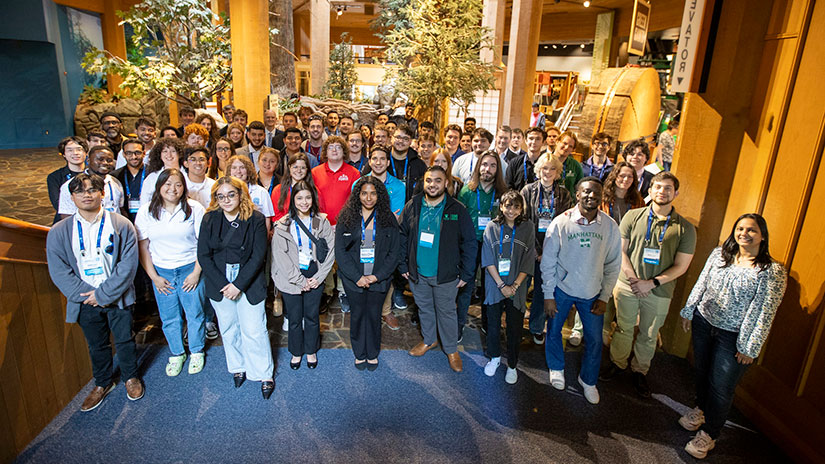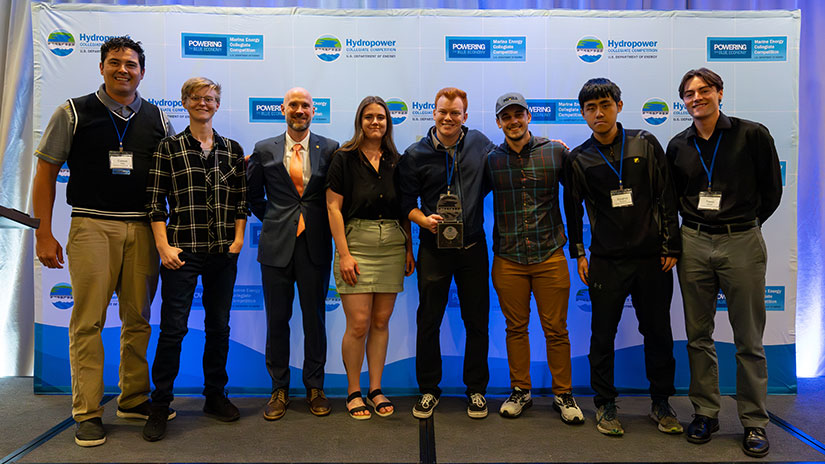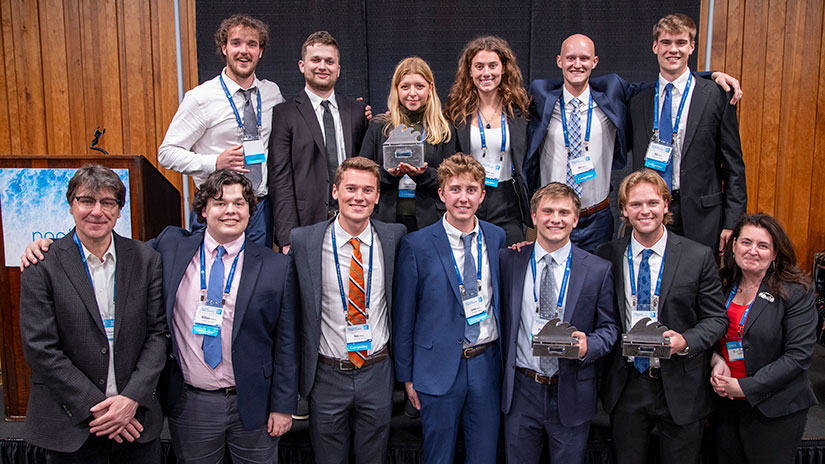Marine Energy and Hydropower Collegiate Competitions Name Winners—and Next Year’s Hopefuls
Student Teams Take Home Cash Prizes and Real-World Experience in These Annual Competitions

Two student teams have claimed first place in the U.S. Department of Energy’s (DOE’s) annual water power collegiate competitions! The University of New Hampshire team was named overall winner in the 2024 Marine Energy Collegiate Competition (MECC), and Northern Arizona University took the top spot in the Hydropower Collegiate Competition (HCC). At the conclusion of the events, competition organizers also awarded second- and third-place prizes and announced winners of individual categories within the competition.
The annual MECC and HCC, administered by the National Renewable Energy Laboratory (NREL), invite students to develop solutions for complex water power challenges while offering them access to real-world experience and professional connections that can give them a head start with a career in clean energy.
“These competitions are an invaluable way to get college students excited about water power,” said Arielle Cardinal, a project manager for NREL’s water power program who manages the MECC. “We had some really creative entries to this year’s competitions, and we look forward to seeing how these student teams translate their experience into real-world career opportunities.”
Hydropower Collegiate Competition 2024 Winners

Teams competing in HCC 2024 were asked to develop solutions to add power-generating infrastructure to existing nonpowered dams over three required challenges and one optional challenge. The nine competing teams presented their work at the 2024 Spring National Hydropower Association/Midwest Hydro Users Group Regional Meeting in Des Moines, Iowa, which took place April 29–May 1, 2024.
After reviewing the presentations, the competition’s expert judges announced the following overall winners of the 2024 HCC:
- Overall first place: Northern Arizona University
- Overall second place: Johns Hopkins University
- Overall third place: California Polytechnic State University, San Luis Obispo.
The judges also awarded the following individual category winners:
- Siting Challenge and Design Challenge: Northern Arizona University
- Community Connections Challenge (tied): Johns Hopkins University and Northern Arizona University
- Optional Build and Test Challenge: Johns Hopkins University
- Best Poster: University of North Florida.
The judges also gave special recognitions to the University of Michigan for “Rising to the Challenge” and named Texas Tech University “Most Energized.”
Marine Energy Collegiate Competition 2024 Winners

During this year’s MECC, teams were required to develop solutions over four contests for ways marine energy can help power the blue economy. The 17 competing teams presented the results of their work at Pacific Ocean Energy Trust’s Ocean Renewable Energy Conference in Portland, Oregon, May 20–23, 2024.
At the event, judges announced the following overall winners of the 2024 MECC:
- Overall first place: University of New Hampshire
- Overall second place: Purdue University
- Overall third place (tied): Oakland University and Oregon State University.
The judges also selected the following individual category winners:
- Business Plan Challenge: University of New Hampshire
- Technical Design Challenge: University of New Hampshire
- Build and Test Challenge: Oregon State University
- Community Connections Challenge: Purdue University
- Rookie of the Year Award: Rutgers University.
Kicking Off the 2025 Competitions
A total of 36 teams were selected to compete in the next MECC and HCC. While next year’s competitors will participate in many of the same contests as this year, for the first time, next year’s cohort will be paired with industry mentors who can assist with competition deliverables throughout the year.
“Students will now have access to industry experts that can provide technical expertise, career advice, and other insights into how to navigate the industry,” said Elise DeGeorge, NREL senior project leader who manages the HCC. “We’re excited that our biggest-ever cohort of competing students will have this additional resource to help them connect the dots between education and career.”
The following 23 teams were selected to compete in the sixth annual MECC:
- Baldwin Wallace University
- California Polytechnic State University, San Luis Obispo
- California State University, Fresno
- California State University, San Marcos
- Cornell University
- Dartmouth College
- Hawai’i Pacific University
- Illinois Institute of Technology
- Manhattan College
- Michigan Technological University
- Northern Arizona University
- Oakland University
- Oregon State University
- Purdue University
- Rutgers University
- Stanford University
- University of California, Riverside
- University of Houston
- University of Michigan
- University of New Hampshire
- University of North Carolina at Charlotte
- University of Washington, Seattle
- Webb Institute.
The following 13 teams were selected to compete in the third annual HCC:
- California Polytechnic State University, San Luis Obispo
- California State University, Fresno
- Northern Arizona University
- Purdue University
- Southern Utah University
- Texas Tech University
- University of California, Riverside
- University of Colorado Boulder
- University of Houston
- University of Michigan
- University of North Florida
- University of Texas at Austin
- Vanderbilt University.
Congratulations to the winners of this year’s competitions, and good luck to next year’s competitors!
Both competitions are funded by the U.S. Department of Energy’s Water Power Technologies Office and administered by NREL. The HCC is also administered by the Hydropower Foundation in partnership with NREL.

